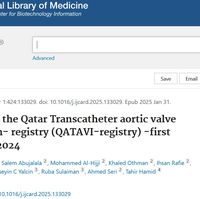abstract
-
Background: Transcatheter aortic valve implantation (TAVI) is a therapeutic modality for high-surgical-risk patients with severe aortic stenosis. This study describes the outcomes of TAVI performed in Qatar. Methods: The Qatar TAVI registry (QATAVI) was established to report the outcomes of TAVI procedures performed at Hamad Medical Corporation- Heart Hospital between October 2012 and December 2023. Data were collected both prospectively and retrospectively. Results: 241 patients underwent TAVI, with a mean age of 73 ± 8 years. The device success rate was 98.8%. In-hospital para-valvular leak (PVL) was as follows: mild 8.3%, moderate 0.8%, and severe 0.0%. At 1-year, PVL was mild 2.9%, moderate 0.4%, and severe 0.0%. At 2 years, 0.4% had mild PVL, moderate 0.4%, and severe 0.0%. The incidence of stroke was 2.1% during hospitalization, 2.1% at 1 year, and 1.2% at 2 years. For myocardial infarction, the in-hospital rate was 0.8%, at 1 year 3.3%, and 1.2% at 2 years. 3.7% developed heart failure during the hospital stay, 15.4% at 1 year, and 4.6% at 2 years. The 30-day mortality rate was 2.0%, while the 1-year survival rate was 91%. Among the 1-year mortality, 67% died from non-cardiovascular causes. Conclusion: The inaugural report of QATAVI demonstrates a success rate that matches international standards, favorable early and late valvular functions, and improved clinical outcomes related to major adverse cardiovascular events. Moreover, the survival rates observed in this cohort align with those reported in global registries, demonstrating the safety and effectiveness of the TAVI procedure in Qatar.
